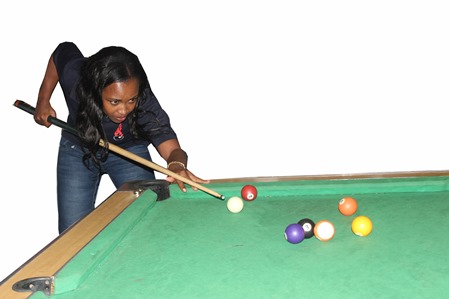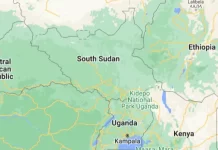by Ray Mwareya
Zimbabwe’s idle youths, bending under a reality of 80% joblessness, and an economy stuffed by $9, 9 billion in external debt, are now hooked to playing or owning a “snooker” table.
[dropcap]B[/dropcap]enard Woyo, 34, rushes an iron stick over a “snooker” table that stands, in open air, next to crumbled street lights. Taxis and van drivers hoot, fuming that Benard’s “snooker” table has its legs encroaching onto motorway lanes.
Unfazed, a restless crowd (dough vendors, smokers, lunchtime street preachers) all mile around the snooker table betting watches, bangles or $US1 notes. They yell at rival snooker players “sink, sink, ball!”

A ball flies off the “snooker” table and scratches the window of an ambulance idling behind a solar powered traffic light.
A municipal traffic policeman accelerates his bicycle and approaches Benard’s snooker table. The table is blocking a telegraph pole leading to the city mayor’s office. “Your snooker table is an offense,” complains the officer.
Benard fumbles a $2 note into the officer’s collar. The “tip” scurries the officer away – for a week!
This not Macau or some other international gambling paradise.
This is an astonishing scene, prevalent in Zimbabwe’s cities, towns and villages today: unlawful “snooker” or “pool” tables erected along highways, open street sidewalks, under grey bridges, banks entrances, even outside church gates.
A whole generation of youths have been consumed to the frenzy of gambling to earn a living. PriceWaterhouse Coopers, the global accountancy firm, lists Zimbabwe among Tanzania, Kenya and Nigeria as frontiers where legalized and unlawful gambling will accelerate rapidly as an industry.
Read Also: Why Are Somalis Africa’s Best TV Watchers?
Zimbabwe’s idle youths, bending under a reality of 80% joblessness, and an economy stuffed by $9, 9 billion in external debt, are now hooked to playing or owning a “snooker” table.
“This is a sport motivated by desperation – an appetite to earn any sort of income. Remember we have thousands of unemployed university graduates,” says Neu Bangwa, an independent economist in the nation´s capital Harare.
But daring owners of these street “snooker” tables claim they are pocketing enviable profit and earning a decent living.
“Our country is importing more snooker tables than infant porridge,” laughs Benard who loves to call himself a “snooker entrepreneur.” Frentic with purposeful joy, he claims to own nine unlawful snooker tables dotted in open on the streets of the capital, Harare.
“I place my tables next to rail platforms, mall fire escape routes and even cinema cabins.”
Benard says he lost his job as a small brewery floor man in June 2013 after a Chinese firm took over and slashed staff numbers. In July 2013, the Zimbabwe National Social Security Employment Registration statistics reports showed that 711 companies have closed in 24 months. This threw 8336 workers onto the street.
Benard Smitten is by Zimbabwe’s widespread joblessness and saddled with the task of feeding twin seven year old daughters. “After losing my job, I had to think fast,” he says.
He took a gamble and sunk his entire $US1200 severance package to buy three “snooker” tables.
“Snooker tables distract streets. Yes, this is unlawful but my business is a flourish,” he gloats.
His joy is in plain sight. At international bus terminals and outside passport renewal offices, drivers and punters in Zimbabwe are playing “snooker” for survival, stretching or sinking dollars.
Victorious players double their game earnings, the vanquished risk their bus fares or weekly wages.
“Snooker” was once a rare sport, loosely followed in this former British colony. It was mainly restricted to Zimbabwe´s coloured community, but now the sport is being played for survival not mere enjoyment.
Every weekend, buses and trucks ferry new snooker tables into Zimbabwe from neighboring South Africa, a country 1600 kilometers away. In South Africa a “snooker” table costs 10, 000 Rands ($700)
The Zimbabwe Snooker Owners Association says the capital Harare, a city of 960 square kilometres, hosts approximately 2000 snooker tables in salons, bars and smoke rooms. In addition, 200 illegal snooker tables now clog the city’s streets says Mr. Alli Nelson, the association’s secretary.
For a fee of $20, amateur iron technicians offer their ‘expertise’. That means digging and fastening illegal snooker tables on warehouse alleys, stadium sloping, street brick lanes or fruit stalls. All this takes place under the cover of night and dusk.
This petty brush with city by-laws does not dampen Benard’s appetite for his business. “I pocket $100 every Friday from my snooker tables located on the city’s roads.”
For him this is a bountiful amount. He pays for his daughters schooling, settles rent and can afford an Easter lamb for celebration.
Finding a lucrative spot to place one’s snooker table is not easy in the city. Turf wars often break out among rival snooker owners.
“Busy taxi platforms are coveted by all table owners,” says Benard.
To outsmart competitors Benard offers ‘incentives’ to punters who play on his tables. Spectators and players are serenaded with relentless high volume Congolese Rhumba music. Blaring stereo speakers, tied on flower branches, hover down over snooker tables amplifying the chaos and noise of the city.
Still, daring criminals can target tables, strip their hinges, nick roads, balls or even uproot the entire table.
“Pickpockets, thieves get five rubber lashes on their buttocks from crowds,” he warns.
The law too can be harsh. Municipal police riders on bicycles and rugby helmets frequently swoop on street snooker tables. They say snooker tables distract motorists, sow pitiful noise and disorderliness in the cities thus increasing road fatalities.
“It’s a faint accusation,” says Bernard. He accuses back: “unrepaired street potholes swallow the legs of our snooker tables.”
Municipal police raids are usually pacified through back hand tactics. A daily $US2 bribe or a weekly bottle of Scotch will keep a demanding officer at bay.
With the informal economy feeding up to $US 1,7 billion into Zimbabwe’s $US4 billion budgeted economy, the government has hinted at an aggressive move to extract tax from street entrepreneurs like snooker table owners, mobile phone cards resellers and tomato hawkers on the city’s alleyways.
“Zimbabwe’s youth are restless,” says Ms. Anele Govo, a labour economist. “They will trade the streets to survive.”
Robberies are now rife in the city too. For Benard, collecting his tables earnings every evening can be frightful.
Read Also: Male Circumcision in Africa: Can it Prevent HIV ?
But protection is easy to come by. He laughs, “the same, municipal police officers guard our tables at dusk. For a fee of course.”
(Ray Mwareya is Global South Development Magazine’s Global Development Reporter reporting on African development and humanitarian issues.)










